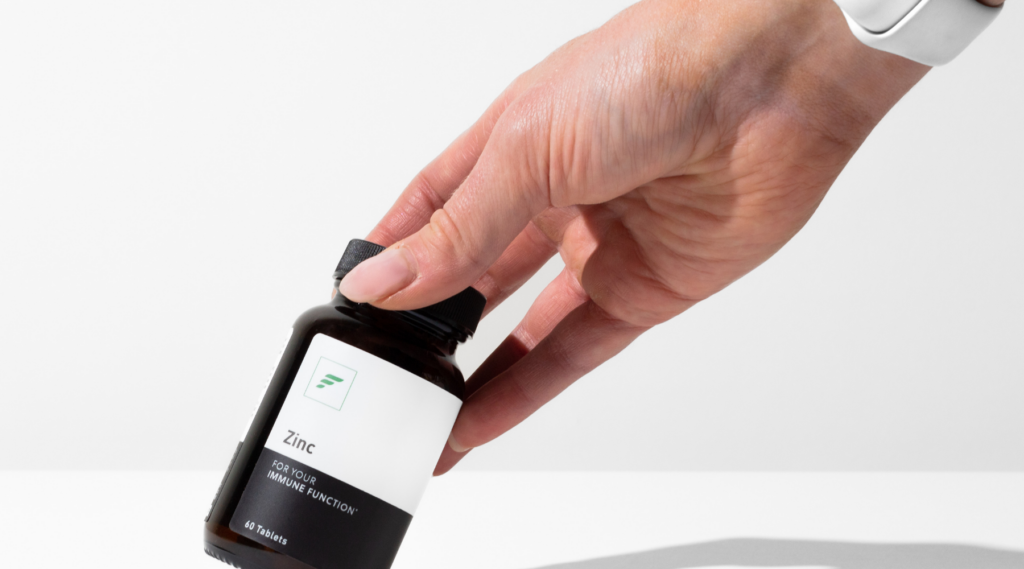Zinc

Why do we need zinc?
Zinc plays critical roles in immune function, protein synthesis, wound healing, DNA synthesis, and cell division. Zinc is critical for the development and function of immune cells and it’s important for the maintenance of healthy hair, skin and nails.
Symptoms of a zinc deficiency include growth and development impairment (children), chronic diarrhoea, skin rashes, slow wound healing, weak immunity response and behavioural issues (1,2).
Food sources of vitamin Zinc.
Zinc is found primarily in animal products such as beef, poultry, and shellfish. Lower levels can be found in whole grains, legumes, nuts and seeds.
What is the Nutrient Reference Value of Zinc?
10 mg/day for adults. The upper limit for zinc is 40mg/day (3).
For who do we recommend a supplement?
People who follow a vegetarian or vegan diet, consume alcohol, or have been diagnosed with certain diseases such as sickle cell anaemia or gastrointestinal diseases may require a higher intake than healthy people or those who consume meat.
Furthermore, zinc supplementation is an effective method for maintaining a healthy immune function and it can help in reducing the duration and severity of the common cold (4). It may also help to lower the susceptibility to pneumonia and other infections and help clear acne (2, 5, 6).
Studies have shown that symptoms of depression and low mood may be improved by zinc supplementation for some people (7, 8).
FFF Supplement Dose.
15 mg
Why choose supplements from Fresh Fitness Food?
Zinc absorption from zinc citrate is one of the highest. Furthermore, zinc citrate has better sensory properties and doesn’t give a bitter and metallic aftertaste as with other forms (9).
When it comes to our health, the food we put in our bodies can have a significant impact in many ways. It affects our mood, energy levels, stress, physical activity and everything in between. The right nutrition can help us to feel better, every day. At Fresh Fitness Food we believe in a food-first approach as food provides you with so much more than just nutrients. Many of us should be able to get most nutrients from a healthy and balanced diet, however, there are some caveats and exceptions where food supplements can assist to fill up the gaps.
If you are unsure or have any questions about food supplements, you can book in for a call with one of our all-knowing nutritionists here (link: https://meetings.hubspot.com/fffcall/supplements-consultation).
Fresh Fitness Food provides personalised meal plans delivered straight to your door, ensuring not only that you have the nutrients you need to manage your stress levels, but also that you have the time usually spent shopping, cooking and washing up, to engage in your favourite stress-reducing activity. To discuss which nutrition plan is right for you, book a call with our in-house nutrition team here.
Order today and start smashing your goals with personalised nutrition!
Get £50 off a 5-day trial with code: BLOG50. Start your trial here
References
- Hambidge, M., 2000. Human Zinc Deficiency. The Journal of Nutrition, 130(5), pp.1344S-1349S.
- Tuerk, M. and Fazel, N., 2009. Zinc deficiency. Current Opinion in Gastroenterology, 25(2), pp.136-143.
- Hsis.org. 2021. Zinc | HSIS. [online] Available at: <https://www.hsis.org/a-z-food-supplements/zinc/> [Accessed 15 July 2021].
- Hemilä, H., Fitzgerald, J., Petrus, E. and Prasad, A., 2017. Zinc Acetate Lozenges May Improve the Recovery Rate of Common Cold Patients: An Individual Patient Data Meta-Analysis. Open Forum Infectious Diseases, 4(2).
- Meydani, S., Barnett, J., Dallal, G., Fine, B., Jacques, P., Leka, L. and Hamer, D., 2007. Serum zinc and pneumonia in nursing home elderly. The American Journal of Clinical Nutrition, 86(4), pp.1167-1173.
- Cervantes, J., Eber, A., Perper, M., Nascimento, V., Nouri, K. and Keri, J., 2017. The role of zinc in the treatment of acne: A review of the literature. Dermatologic Therapy, 31(1), p.e12576.
- Sawada, T. and Yokoi, K., 2010. Effect of zinc supplementation on mood states in young women: a pilot study. European Journal of Clinical Nutrition, 64(3), pp.331-333.
- Ranjbar, E., Shams, J., Sabetkasaei, M., M-Shirazi, M., Rashidkhani, B., Mostafavi, A., Bornak, E. and Nasrollahzadeh, J., 2013. Effects of zinc supplementation on efficacy of antidepressant therapy, inflammatory cytokines, and brain-derived neurotrophic factor in patients with major depression. Nutritional Neuroscience, 17(2), pp.65-71.
- Wegmüller, R., Tay, F., Zeder, C., Brnić, M. and Hurrell, R., 2013. Zinc Absorption by Young Adults from Supplemental Zinc Citrate Is Comparable with That from Zinc Gluconate and Higher than from Zinc Oxide. The Journal of Nutrition, 144(2), pp.132-136.